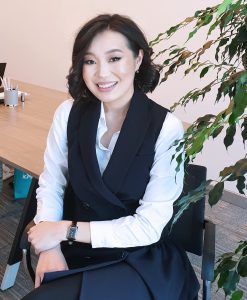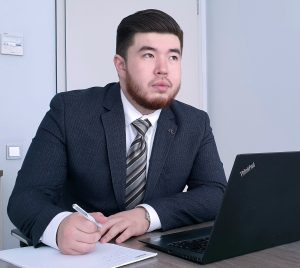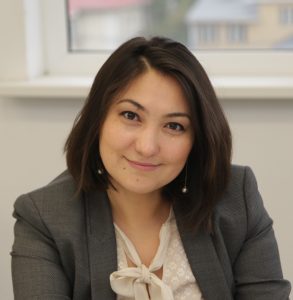NU alumni careers: I work for KPMG
An in-depth and sophisticated understanding of their domain of study; to be intellectually agile, curious, creative, and open-minded; to be thoughtful decision-makers who know how to involve others; to be entrepreneurial, self-propelling, and able to create new opportunities, and to be prepared to take a leading role in the development of their country – these are some of the graduate attributes that NU graduates shall possess.
Is merely having the NU Graduate Attributes enough to get a job in one of the Big Four companies? What else does a graduate need to know to get a good job? How do higher education institutions prepare graduates for the workforce and life after leaving university?
KPMG Kazakhstan and Central Asia currently employees more than 700 people in Central Asia and more than 210 000 people around the world. Today, we will speak with four current employees to shed light on the above questions and more. Two of them are NU Alumni – Mereigul Gumarova and Daniyar Dyuskaliev. Next is Mr. Saken Zhumashev, the company’s Managing Partner will tell us, about the principles of recruitment and what characteristics successful KPMG employees have. In her turn, Ms. Dariga Kenbayeva, Head of the HR Department, will share her incites about the potential mistakes made by graduates during interviews and how to avoid them.
Mereigul Gumarova, a 2017 graduate of the School of Science and Technology (now the School of Engineering and Digital Sciences), an auditor of KPMG in Kazakhstan and Central Asia, said that after her graduation, she decided to work in the field of economics and business.
What role did the university play in your professional self-realization?
– The university provided us with fundamental knowledge that helped us fulfill ourselves; an opportunity to move up in our career and as well as academically. I am grateful to the university for teaching me how to prioritize, set goals, and achieve them.
In your opinion, what qualities should a student/ graduate have to get a job?
-A graduate must have professional knowledge as well as good communication and analytical skills. Other necessary skills are things such as being a team player, a willingness to take responsibility, the ability to work with clients, and the ability to learn new knowledge (i.e., lifetime learning).
Did your views on life change after graduation?
-There has not been a significant change in attitudes toward life since graduation. I felt a strong desire to acquire new knowledge and skills in auditing. I had only a few interviews in my life. All interviews were successful, but I chose KPMG.
Daniyar Dyuskaliev, a consultant of the Tax and Legal Consulting Department, KPMG in Kazakhstan and Central Asia, graduated from the School of Science and Technology (now the School of Engineering and Digital Sciences) in 2019.
 -As any young man graduating from university, I wanted to get a promising job, where I could become an excellent specialist and contribute to the development of the company. Now, working in KPMG, I can say that I have achieved my goal and realized my potential. The interview at KPMG was my first and, so far, the only interview. That I managed to interest such a serious company from the onset, was a sign to me that this is the right place for me right now. In practice, my work is quite fulfilling, because I feel both needed and useful.
-As any young man graduating from university, I wanted to get a promising job, where I could become an excellent specialist and contribute to the development of the company. Now, working in KPMG, I can say that I have achieved my goal and realized my potential. The interview at KPMG was my first and, so far, the only interview. That I managed to interest such a serious company from the onset, was a sign to me that this is the right place for me right now. In practice, my work is quite fulfilling, because I feel both needed and useful.
What difficulties did you face at the interview? In your opinion, what qualities should a student/ graduate have to get a job?
– The one thing I thought at the interview was, “How do I express my thoughts so that they can be understood correctly? In general, if you are confident in your capabilities and knowledge, difficulties should not arise. To become more confident and have success in employment – you simply need to have a desire to always learn something new, to look for opportunities for self-development and self-realization, and to believe in yourself and your strength.
Did your views on life change after graduation? Were there memorable episodes in your university and postgraduate life that significantly changed your world view?
-For me, Nazarbayev University taught me a lot about life. Before graduating from high school, I had only ever lived with my parents. At 17 years old, I had no idea what it was like to move to another city and live alone, to distribute my finances independently without counting on anyone’s help. I will always be grateful to my university for the fact that I managed to develop independence and discipline in myself. These are life skills that I believe are necessary for any adult and self-sufficient person to possess. By the time I graduated, I realized how much I had already grown and that I was ready to realize my goals.
Saken Zhumashev, Managing Partner, KPMG in Kazakhstan and Central Asia.
Which employees are your success story? What qualities are important for good work and promotion in the company?
 -Meritocracy is the guiding principle for the Big Four companies and it permeates our operation. We have safety measures in place to ensure that meritocracy is upheld at all stages of an employee’s career – from recruitment, annual review, and advancement. When recruiting personnel we make sure that the best employees come to work for us.
-Meritocracy is the guiding principle for the Big Four companies and it permeates our operation. We have safety measures in place to ensure that meritocracy is upheld at all stages of an employee’s career – from recruitment, annual review, and advancement. When recruiting personnel we make sure that the best employees come to work for us.
We first check the technical knowledge of the candidate. We also pay attention to soft skills like a person’s ability to express his or her position and thoughts. Our employees frequently interact with clients, so they must be able to effectively communicate with others. If all these criteria coincide, then a candidate comes to our company.
All employees undergo an annual performance review, where the effectiveness of their work is assessed. The employee receives feedback on the results of his work from peers working at the same level, as well as the level above and below. This system provides an objective 360-degree assessment. In this way, we can see how effective the work of each employee is during a period of time. Responsibility, initiative, ambition, and openness in communication are the specific qualities KPMG prizes in an employee, and they are necessary for good work and career advancement.
What results do you expect from a new employee during the probation period?
– All new employees can be divided into two categories: in the first category are those employees who have just graduated, while in the second category are so-called experienced employees who have the knowledge, they must demonstrate their experience and help us in implementing projects. Accordingly, during the probation period, we try to evaluate the person’s “fit”. We want to know if the person shares the same values as our company, and of course, we want to understand his or her motivation and initiative. For us, a good fit is key. In addition, we look if a person is results-oriented. After receiving a difficult task some people cannot solve the problem on their own, even after spending significant time on it. While others can quickly cope with a task. I would like to note that during the probation period, we look at the integrity of the person, because such person will represent the company in the market, and our task is to associate only the right people with KPMG.
How would you characterize KPMG’s corporate culture? What type of employees are successful? Which ones fail?
-The culture within the company is dictated by the basic principles of meritocracy. A successful employee is one who is growing and developing. Speaking about KPMG’s corporate culture, we seek to maintain a collegial atmosphere, while still expecting a high level of employee performance. At the same time, we take an individual approach to each employee and invest in his or her development, which in turn motivates the employee to grow and develop. We have a mentorship program and this is noted by all our employees. Our corporate culture is designed to meet our shared goal of achieving results and success together. If we talk about people who thrive in this culture, they are people who are ready to take on new responsibilities, new challenges, and have a desire to move forward.
Dariga Kenbayeva, Head of HR Department, KPMG in Kazakhstan and Central Asia.
What are the main mistakes that alumni make in their interviews?
 -There are mainly two mistakes. The first one – failure to show motivation. Before the interview, it is necessary to think over how to answer the question “Why do you want to work here”? Besides, to prepare for an interview candidates need to do their homework about our company. They should be able to ask the right questions after having studied KPMG’s history and our latest projects in advance.
-There are mainly two mistakes. The first one – failure to show motivation. Before the interview, it is necessary to think over how to answer the question “Why do you want to work here”? Besides, to prepare for an interview candidates need to do their homework about our company. They should be able to ask the right questions after having studied KPMG’s history and our latest projects in advance.
And the second – is overstating one’s qualifications on the CV. Sometimes even when a CV looks good, if the in-person interview does not match the expectations, we will not make an offer. For example, if the CV declares fluency in English, and the graduate did not understand the interview questions in English, we are not in hurry to recruit them.
What do you pay attention to when looking at resumes of graduate candidates?
-First of all, we pay attention to education and GPA, and then we look at their knowledge of programs and languages, internships, and work experience.
How would you characterize the NU graduates?
-NU graduates are in demand in our company in different departments. They are young people who clearly know what they want and achieve their goals.


